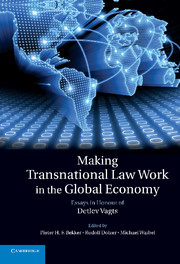Book contents
- Frontmatter
- Contents
- List of contributors
- Foreword: the transnationalism of Detlev Vagts
- List of cases cited
- List of abbreviations and acronyms
- Introduction: a Festschrift to celebrate Detlev Vagts' contributions to transnational law
- 1 Detlev Vagts and the Harvard Law School
- 2 Constructing and developing transnational law: the contribution of Detlev Vagts
- I International law in general
- 3 ‘Hegemonic international law’ in retrospect
- 4 Textual interpretation and (international) law reading: the myth of (in)determinacy and the genealogy of meaning
- 5 The changing role of the State in the globalising world economy
- 6 Sources of human rights obligations binding the UN Security Council
- 7 Is transnational law eclipsing international law?
- 8 Participation in the World Trade Organization and foreign direct investment: national or European Union competences
- 9 From dualism to pluralism: the relationship between international law, European law and domestic law
- 10 Transnational law comprises constitutional, administrative, criminal and quasi-private law
- 11 Founding myths, international law, and voting rights in the District of Columbia
- 12 The tormented relationship between international law and EU law
- 13 International law scholarship in times of dictatorship and democracy: exemplified by the life and work of Wilhelm Wengler
- II Transnational economic law
- III Transnational lawyering and dispute resolution
- Bibliography of Detlev Vagts
- Index
8 - Participation in the World Trade Organization and foreign direct investment: national or European Union competences
from I - International law in general
Published online by Cambridge University Press: 17 November 2010
- Frontmatter
- Contents
- List of contributors
- Foreword: the transnationalism of Detlev Vagts
- List of cases cited
- List of abbreviations and acronyms
- Introduction: a Festschrift to celebrate Detlev Vagts' contributions to transnational law
- 1 Detlev Vagts and the Harvard Law School
- 2 Constructing and developing transnational law: the contribution of Detlev Vagts
- I International law in general
- 3 ‘Hegemonic international law’ in retrospect
- 4 Textual interpretation and (international) law reading: the myth of (in)determinacy and the genealogy of meaning
- 5 The changing role of the State in the globalising world economy
- 6 Sources of human rights obligations binding the UN Security Council
- 7 Is transnational law eclipsing international law?
- 8 Participation in the World Trade Organization and foreign direct investment: national or European Union competences
- 9 From dualism to pluralism: the relationship between international law, European law and domestic law
- 10 Transnational law comprises constitutional, administrative, criminal and quasi-private law
- 11 Founding myths, international law, and voting rights in the District of Columbia
- 12 The tormented relationship between international law and EU law
- 13 International law scholarship in times of dictatorship and democracy: exemplified by the life and work of Wilhelm Wengler
- II Transnational economic law
- III Transnational lawyering and dispute resolution
- Bibliography of Detlev Vagts
- Index
Summary
Introduction
As a true international lawyer and multilingual citizen of the world, Detlev Vagts has always shown interest in other legal cultures. He is a close observer and analyst of legal developments in Europe. Through his language abilities, Detlev Vagts has direct access, for example, to German legal thought. I hope that my contribution on German and European approaches to WTO law and foreign investment will attract his interest.
The background to my contribution is set by the Lisbon Treaty. This Treaty was the second attempt to reorganise the European Union (EU) in response to the recent enlargements and the continuing extension of its activities. A first attempt, the Constitutional Treaty, failed after it was rejected in 2005 by referenda in France and The Netherlands. The new Treaty drops most of the symbolism that characterised the Constitutional Treaty but aims to maintain much of its substantial impact – e.g. in the areas of criminal law, fundamental rights and international relations. Following a long and difficult ratification process – including a failed referendum in Ireland, seemingly endless political debate and judicial hurdles before Constitutional Courts – the Lisbon Treaty came into force on 1 December 2009 after Ireland, Germany, Poland and the Czech Republic overcame their respective domestic problems concerning ratification.
- Type
- Chapter
- Information
- Making Transnational Law Work in the Global EconomyEssays in Honour of Detlev Vagts, pp. 108 - 131Publisher: Cambridge University PressPrint publication year: 2010
- 1
- Cited by



